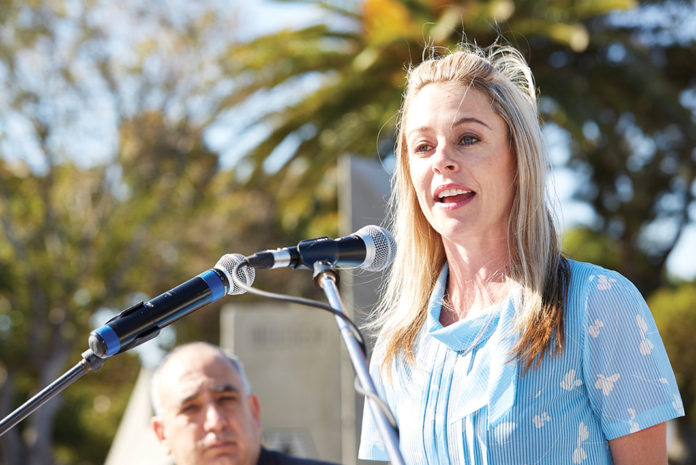By By Ben Rabinowitz and Gilad Stern
A woman sang solo at Cape Town’s annual Yom Hashoah Holocaust Memorial ceremony in April.
It hardly seems a big deal, and it shouldn’t be a big deal. It was a return to normality after about ten years in which a woman’s voice in song had been banned at Yom Hashoah, in order to defer to the requests of some who felt that they could not allow themselves to hear a woman’s voice in song.
Half of all Jews, the women, were effectively told: “Be silent. You may be seen, but not heard, in song at least”.
So, at the recent Yom Hashoah ceremony, Caely-Jo Levy sang a Yiddish song, Mir Lebn Eybik, composed by Vilna poet Leyb Rosenthal, who was murdered in the Klooga concentration camp in Estonia.
The words of the song include: “We will endure; we are an eternal people; no matter how wretched the season, the hour, we will endure.”
This significant milestone for Cape Town’s Jewish Community was achieved only after a section of the Jewish Community approached the Cape High Court.
This was done after the organisers refused the entreaties to end the gender discrimination. The litigating parties argued that there were other remedies for being sensitive to some persons’ feelings, other than silencing all women! There was a public controversy, but in the end the ban was cancelled, rather than going to the High Court. The parties settled on a win-win process:
The formula agreed to (in a settlement which was made an Order of Court) was that the ceremony would have two parts — the initial section would include a woman singing solo. The ceremony started at 10:30am, with over a thousand people in attendance.
After the initial section, at 11:00am, whilst the names of young victims of the Holocaust were being read out and memorialised, the persons who wanted to avoid hearing a woman sing, entered discreetly. It was dignified and subtle.
What was achieved was something utterly simple and logical: whoever didn’t want to hear the singing came a half-hour late. The ban on woman singing was consigned to history. That is as it should be.
Earlier that week in Israel, the national Yom Hashoah ceremony, at Yad Vashem was broadcast on TV, with President Rivlin, Prime Minister Netanyahu, and the two Chief Rabbis, Ashkenazi and Sepharadi, present, as well as others including former Chief Rabbi Lau. A female singer with a wonderful voice, sang on three occasions, the last one being the singing of Hatikvah. It seems that it is acceptable for a female soloist to perform at Yad Vashem, carried live on all TV channels, and in the presence of the Israeli Chief Rabbis. That should be unremarkable. It’s hard to imagine that the Israeli Chief Rabbis are lax in their observance of religious strictures.
Rabbi Julia Margolis, Head of SACRED (the South African Centre for Religious Equality and Diversity), one of the parties to the court action, said:
“The fact that a woman is singing at a Holocaust ceremony should be unremarkable. I am thrilled that sanity has triumphed, and that gender discrimination has ended. My grandmother is particularly pleased: she is a holocaust survivor, whose family perished in the concentration camps. She is proud that I have been active in getting the ban on women’s voices lifted. When we say ‘never again’, we mean just that: never again should discrimination and prejudice be the standards of a civilised society. No voices should ever be silenced because of gender or race. We are all people, all of us”
Cape Town Jewry has now aligned itself with normative practice in Israel, and with the norms of South African society which abhors discrimination, for all the obvious historical and moral reasons. The ceremony was moving and dignified.
So a woman sang…
It really was no big deal.
Benjamin Rabinowitz was formerly involved in property and now semi-retired, Ben supports many cultural, educational and charitable institutions. He is also actively involved in community issues and has led the campaign to stop the Oudekraal and Sea Point Promenade developments.
Gilad Stern is a Management Consultant in Cape Town, and a mountaineer.











